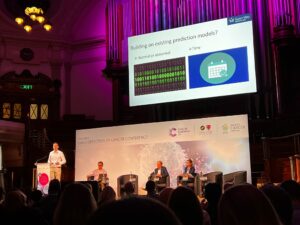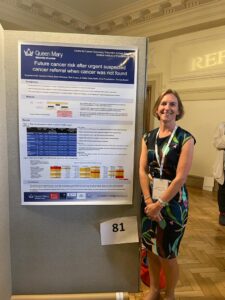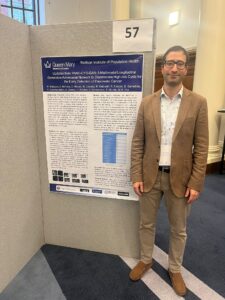The Early Detection of Cancer Conference London October 2023
 Dr Garth Funston gave an invited talk during the Multicancer Early Detection (MCED) – beyond ctDNA session at the Early Detection of Cancer Conference. His talk focussed on the challenges we face in detecting cancer within primary care and how MCED approaches might help us achieve earlier diagnosis. The ongoing CanDetect project was showcased as a key exemplar approach aimed at identifying patients with types of cancer which overlap in their symptom profiles. Other ongoing innovative research studies, including work to harness free text data using natural language processing (NLP) and use of CA125 based models to identify different types of cancer was also highlighted. The talk generated much discussion on the potential role of MCED tools and the advantages and disadvantages of NLP and free text data.
Dr Garth Funston gave an invited talk during the Multicancer Early Detection (MCED) – beyond ctDNA session at the Early Detection of Cancer Conference. His talk focussed on the challenges we face in detecting cancer within primary care and how MCED approaches might help us achieve earlier diagnosis. The ongoing CanDetect project was showcased as a key exemplar approach aimed at identifying patients with types of cancer which overlap in their symptom profiles. Other ongoing innovative research studies, including work to harness free text data using natural language processing (NLP) and use of CA125 based models to identify different types of cancer was also highlighted. The talk generated much discussion on the potential role of MCED tools and the advantages and disadvantages of NLP and free text data.
 Professor Suzanne Scott’s team took two posters to the Early Detection of Cancer Conference, both surrounding the scope for early detection initiatives connected to urgent suspected cancer referral pathways. The first poster was selected for a lightning presentation on day two of the conference – requiring a 4 minute summary of the work to all delegates. This talk outlined the findings of a national cohort study looking at risk of future cancer in the 5 years following urgent suspected cancer referral when no cancer was initially found. This was the first analysis of its kind and indicates a higher risk of subsequent cancer than would be expected for people of similar age and gender. The analysis has also given an insight into the types of subsequent cancers after each referral pathway. This provides useful data to inform the content of possible interventions and whether they should include safety netting, active monitoring or cancer prevention. This work has now been published in The Lancet Oncology (https://www.sciencedirect.com/science/article/pii/S1470204523004357).
Professor Suzanne Scott’s team took two posters to the Early Detection of Cancer Conference, both surrounding the scope for early detection initiatives connected to urgent suspected cancer referral pathways. The first poster was selected for a lightning presentation on day two of the conference – requiring a 4 minute summary of the work to all delegates. This talk outlined the findings of a national cohort study looking at risk of future cancer in the 5 years following urgent suspected cancer referral when no cancer was initially found. This was the first analysis of its kind and indicates a higher risk of subsequent cancer than would be expected for people of similar age and gender. The analysis has also given an insight into the types of subsequent cancers after each referral pathway. This provides useful data to inform the content of possible interventions and whether they should include safety netting, active monitoring or cancer prevention. This work has now been published in The Lancet Oncology (https://www.sciencedirect.com/science/article/pii/S1470204523004357).
The second poster presented results of a recent survey of patients who had been referred on urgent suspected cancer pathways and had no cancer found. We know that there is currently no standardised approach to provide advice after urgent suspected cancer referral and this study looked at patients’ views of the acceptability of receiving advice after urgent suspected cancer referral. We looked at different types of advice, for instance advice to manage ongoing symptoms, advice about early symptoms of different cancers, and advice about reducing risk of future cancer. We found that very few of the participants had received this kind of advice after their referral but most we’re willing to. Advice about reducing risk of future cancer was seen as most acceptable.
 Dr Oleg Blyuss presenting findings from the PANC-CYS-GAN project at the Early Detection of Cancer Conference. There have been major advances in AI in the last five years, and their impact is already visible in the entertainment, automotive and manufacturing industries, but its transformative potential in early detection of PC is yet to be realized.
Dr Oleg Blyuss presenting findings from the PANC-CYS-GAN project at the Early Detection of Cancer Conference. There have been major advances in AI in the last five years, and their impact is already visible in the entertainment, automotive and manufacturing industries, but its transformative potential in early detection of PC is yet to be realized.


